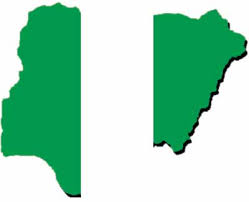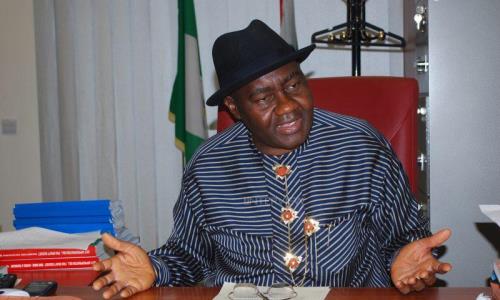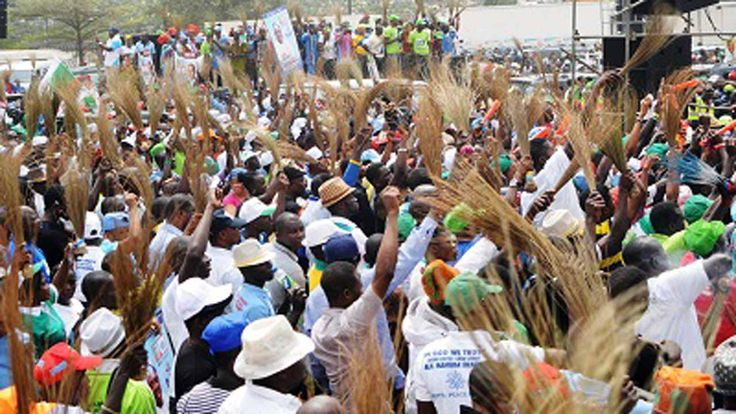Restructuring Nigeria: June 12 as platform for renewed agitation

Nigeria is a difficult country both for the managers and the citizens. There are challenges that confounds both the leaders and the led and the people have been crying out accusing the leaders of not doing enough to address the myriad of problems confronting the land.
Many people believe that the challenges facing the polity is a fallout of the amalgamation of the country that was hurriedly put together in 1914 by the then Governor General, Lord Lugard and the manner the British colonial masters handled the independence of the nation.
However, others believe that from independence until the military intervention when the nation operated a regional government, things were going in the right direction with each region having power over their resources and deciding their own destinies, but that the military intervention in 1966 which introduced a unitary system of government compounded the problems of the nation.
According to this school of thought, the return of power to a democratically elected government first in 1979, before the military again intervened in 1983 or the final return of power to a civilian government in 1999 has not helped the situation as the country only mouths the practice of federalism, but not doing so indeed.
When the Muhammadu Buhari government was elected into office in 2015, many had thought that one of the first agenda of the government would be the restructuring of the country, because many of those who have been campaigning for the restructuring of the country and who have consistently given themselves the toga of progressives form the core of the Buhari ruling party.
Having waited for two years down the line and nothing seem to be happening, Nigerians are now beginning to believe that if they wait for this government to give them the change they desire it may never come, so it appears they are now determined to return to the trenches with the sole aim of putting the country on the path of restructuring.
June 12 this year, which is a day many activists, political elites and social commentators have set aside to always mark the annulled election of June 12, 1993 became a veritable opportunity for the people to speak up with one voice to demand the restructuring of the country.
The renewed call had become urgent because of recent developments in the country which has led many to question the essence of the continuous oneness of the country.
Events such as the neglect of the Niger Delta region by successive governments, the inability of many state governments and even some Federal agencies to pay the salary of their workers as at when due, the rampaging Fulani herdsmen, leading to the death of several persons across the country and the recent quit notice served on the people of the South East by Arewa Youths to vacate the North within three months following the successful stay at home order issued to the Igbos in the South East and some parts of the South South by the Independent Peoples of Biafra (IPOB).
Even the recent activities of IPOB, MASSOB and BIM geared towards the rebirth of Biafra have also been cause for concern.
The aggregation of these concerns and more led many people who participated in the activities to mark the June 12
election and the subsequent death of the presumed winner of the election, Chief MKO Abiola to call on the people to find ways to force the government to rethink the idea of restructuring the country.
Human rights activist and Senator representing Kaduna Central in the National Assembly, Sen Shehu Sani who was the keynote Speaker at a Breakfast Prayers and Tributes session organised by the June 12 Democracy Movement in conjunction with Change Agent of Nigeria Network, at the Ikeja residence of the late Abiola, said that it was high time Nigerians began to rethink the way they relate with those holding political office and start demanding for that which is theirs.
According to him, because the democracy the country currently enjoys is not a gift, but a product of struggle, then the people must fight for what they have.
“The democracy we are savouring today was not a gift given to us by the military, it is also not a product of a lottery that we won, it was a product of struggle and sacrifice. From Kano to Kaduna, Lagos to Ibadan, Enugu and Port Harcourt, Nigerians trooped out to vote for Abiola and the same cities organized protests, civil disobedience to force out the military out of power. Without the struggle of June 12 there could not have been democracy in Nigeria today.
“The change that we experienced in the 2015 election was part of the seed of June 12, it was the same forces that forced the Military out of power that rallied Nigerians to eject the PDP out of power at that time.
“We must always remind ourselves where we came from, it is from a moment Nigeria was in darkness, hundreds of activists were thrown into jail, like the late Chief Gani Fawehinmi, Beko Ransome Kuti among others,” he said.
There were other activists and political minds that joined him to proffer solution to the myriads of Nigeria’s problems, including former Director General of the Nigeria Institute of International Affairs, Prof. Bola
Akinterinwa, Prof. Ishaq Akintola of MURIC, former Speaker of the Lagos House of Assembly, Rt. Hon. Adeyemi Ikuforiji, Chairman of NCP, Dr. Tanko Yinusa among many others.
According to Senator Sani, it was time Nigeria designs a new master plan that would challenge the status quo, “a master plan that will address those germane issues that challenges our very existence as a nation and becoming a plague that is threatening to consume the whole country. We must tell ourselves the truth.
“This is the day for Nigerians to use as an opportunity to question power, to question the inability of power to address the myriads of social economic and political challenges. Solution to the problems of Nigeria is not only the reconstruction of the politics or the reconstruction of our economy and reconstruction of our social existence, but also the reconstruction of the mind.”
The Senator said the reason Nigeria has not improved beyond what it is today is because Nigerians have concentrated in fighting the wrong enemies instead of combining their efforts to fight their common enemy, “ I think it is time for the poor man in the South West, the poor man in the South East and the poor man in the North, to say to himself, as long as the political ruling elites, the bourgeoisie class irrespective of their geographical location are united by a common interest, they should be united by a common plight.
“The enemy is not the Hausa, it is not the Igbo, it is not the Yoruba. Your first enemy is that person within your environment who given the opportunity to lead uses such opportunity to amass wealth for himself and for his family.”
He noted that “The agitations coming from different sections of the country are issues of concern to the stability and unity of the Federal Republic of Nigeria. There is a need for us to do the needful, forces of unity and progressive forces, who are desirous of not only a united Nigeria, but a pan Africa must rise against division and debauchery, we must tell ourselves the truth, we don’t need 36 states, we don’t need 36 ministers, we don’t need bicameral parliament, these structures have become a resource guzzling institutions and is having its toes on our lives on our collective progress on the Nigeria wheel of state.
“There are abundant other factors we need to address that continuously challenge the existence of Nigeria, threatening its unity, there are political issues, social issues, economic issues.
“Nigerian society is still not more about Yoruba, Hausa, Igbo, Ijaw and all the other ethnic nationalities, not so much about North and South, it is still about class, the haves and the have not. If you go to the boardrooms of banks and insurance companies you will see the bourgeoisie class sitting down behind the table and sharing the cake of state.
“They shared NEPA among themselves, they shared public properties built by even colonial masters among themselves in the name of monitisation, they are aspiring to share the refineries among themselves and almost sharing everything among themselves,” he said.
Also speaking, the former Speaker of the Lagos State House of Assembly, Rt. Hon. Adeyemi Ikuforiji, bemoaned what he deemed the loss of value system among all cadres in the nation, a situation he said had further worsened the state of things.
“Our society is that of lost value; our value system has been upside down. Those who played no part in our struggle for democracy are the ones leading, therefore, you don’t expect them to give anything meaningful. The so-called ‘leaders’ today are now trying to change the content of our struggles and history, and yet, we are docile about it,” he noted.
The ex-speaker posited that it was good if everyone learned from the past so that the mistakes of the past would not be repeated.
“Making a mistake is acceptable, but missing the opportunity to correct the mistake made is even a more grievous mistake,” he said.
In his remarks, a renowned poet and civil rights activist, Mr Odia Ofeimun, pointed out that many of the problems that led to the annulment of the June 12 elections, were still very much with the nation today, 24 years after.
He also called for true restructuring of the nation, while adding that in doing so, local governments (LGs) must be equally restructured so that they would have control over their resources.
He stressed for the dividends of democracy to be evenly distributed in such a way that the gap between the rich and the poor will be reduced, and true emancipation delivered unto the populace, the infamous “exclusive and concurrent lists” dichotomy must be revisited, so that more power would be given to LGs to thrive.
The convener of the event, Mr Olawale Okunniyi, described the late Abiola as a martyr of democracy, and called on the Nigerian government to shift from the present type of democracy to a “popular democracy.”
Besides the event at Abiola residence, at the Excellence Hotel, Ogba, another grand June 12 event was put together by the National Coordinator of the Oodua People’s Congress (OPC), Otunba Gani Adams.
There, the former Abia State governor, Dr Orji Uzor Kalu, who was the guest speaker proposed a change to the nations’ democracy day, saying “The Democracy Day celebration should not be on May 29, but on June 12. That date should be the symbol of fairness, equity and obedience to the rule of law.”
Kalu argued that Nigeria as a country is in urgent need of healing as many things have gone wrong with the system, “Nigeria is our country and we cannot run away from it. The country is in need of assimilation, healing and the right democratic ethos. People have a right to do anything that they want, but do not have the right to carry arms.
“In countries like The Gambia, you would not know the difference between a Muslim and a Christian, but Nigeria is drifting away because of quarrel and strife. I am a Catholic, but I have always taken part in all the Ramadan fasts.”
He, like Sanni also urged Nigerian masses to stick together against their oppressors instead of fighting themselves, “The governors have their club, so does the political elite and they are usually united in pushing forward their agenda, but in the end, if the masses do not stick together by pushing their own agenda through the ballot box, they are the ones that will suffer.”
Kalu noted that, “those who want division and trade in blames shows no sign of democracy without bias, we all are comrades and we believed in this platform not to divide Nigeria and our opinion cannot be changed.
“The problem is that our elders shared wrongly, it is better to go back to the regions, where true federalism exists the right thing is for people to work out what they earn and earn what they work,” he said.
Speaking on the essence of putting up such events on annual basis, Gani maintained that the programme was, “an opportunity to learn our lessons and put things very right, to know the implication of not being very good democrats, it is an opportunity to pay a huge respect to the person who paid the price for our democracy.
“It will gear up many of our politicians and civil societies that to be an hero, do what is right at the right
time, make sacrifice for your country so that they will continue to remember you, also that incoming leaders will know that annulling an election, you have annulled the freedom and future of that country.
“In a country that such a thing happens it is only the grace of God that can sustain it, we are just lucky to remain as a country for that serious injury inflicted on us by the military, but we discourage the military not to indulge in such act in the future.”
He also threw his weight behind those calling for restricting saying, “We have to restructure this country, anything short of restructuring is very dangerous, like I told the chairman, Uzor Kalu, that I like the way he is preaching true federalism, as it is the only thing that can save this country, anything short of that we are moving towards anarchy and you can see the voices coming from the North which is unprecedented in this country.
“If we fail to restructure Nigeria in a short while I don’t know what will happen, so it is better our leaders have a listening ear to the voice of the people, this country may not survive without it, we need restructuring for the federating units to coordinate and develop at their own pace,” Gani posited.
The Deputy President, Arewa Youth Council, Alhaji Muhammed Kudu Abubarka traced the trajectory of the nation’s political woes, citing the recent call by the Arewa Youths Forum as a positive one to save our polity.
“We are calling on the Federal Government of Nigeria to include late Abiola’s name on the list of past Presidents of Nigeria, secondly our democracy should be celebrated on June 12, not May 29 because it is the democracy day we recognise.
“People should be very careful of these our politicians, they came and deceived us, our eyes are wide open and we can’t allow that to happen again, we say no to those cabals determining the future of Nigeria, we will not allow that to continue.
“We want restructuring and that is the answer to our political, economic, social problems in Nigeria, restructuring would resolve all the problems. Once this is in place no one would come from any of the regions to deceive me in the North, if you are from my region you cannot deceive me because I know you and where you come from and want you to come and defend yourself.
“Regarding our declaration, yes we are helping the IPOB to achieve their independent state of Biafra, to make the international community see the reason to come and intervene, let the Igbos have their referendum, let us see if truly the Igbos are truly in support of that course because people are making money from this nation without caring for the constituents, if the Igbos are in support of this we will see it in the referendum.”
Former Military Administrator of Lagos State, Kanu Ndubuisi noted that, “peaceful transition to true federalism not minding your tribal alignment is ideal for the progress of the Nigerian nation.”
While Prof. Sophie Oluwole in her short remarks, stated unequivocally that democracy was brought to the nation by the wrong hands, citing patriarchal nature of the nation’s polity as inimical to nationhood.
“Experienced men, women, youths and foreigners are the ones that can manage the Nigerian polity, it is because we did not allow that to prevail, that is why our democracy is jinxed,” she said.
Another contributor, Comrade Tony Uranta hammered on the need for a united course to ensure the unity of the Nigerian nation.
“You need fighters not talkers now than ever, if other groups refuse to come together to consider restructuring, all of us in the South if we are not careful the threat by Arewa is a threat against all other group.
“When it begins no one will ask you for Identity, they would only ask if you are Fulani or Hausa. I regret the fact that my old comrades and friends are now signatories to the threat against Nigeria’s unity.”








